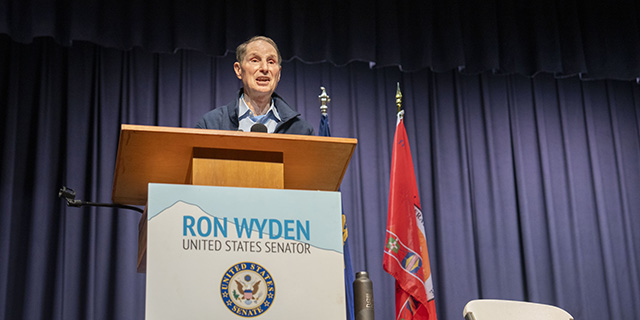Other Views: Trump’s tariffs hurt Eastern Oregonian farmers
Published 10:00 pm Friday, October 3, 2025
The recent East Oregonian piece (Sept. 9, 2025) about tariff uncertainty facing our wheat industry offers a painful reminder of the ongoing assault on rural America and iconic Oregon enterprises from Donald Trump’s tariff rollercoaster.
U.S. import tariffs have climbed to their highest level since 1935, reaching 17.4% as of early September, according to a Sept. 4 Yale Budget Lab report. That’s a nearly century-high water mark, a situation throwing Eastern Oregon farmers into an economic whirlwind they never asked for and don’t deserve.
Those statistics also underscore the cause of the economic worries I heard from wheat growers in Pendleton earlier this year and that I continue to hear from those who make a living off the land in Eastern Oregon.
Farmers like Clinton Carlson, who told the East Oregonian that Trump’s tariffs threaten to make a rough economic situation even rougher. His family has worked the same ranch near Heppner since 1883, exemplifying the resilience of our rural communities. But even the most resilient shouldn’t have to endure manufactured indecision and ambiguity from Washington, D.C.
The discouraging reality is Oregon wheat growers are only now beginning to feel the worst impacts from these tariffs. This season’s wheat crop was planted before the tariff hikes, but the real pain for many producers is arriving now, this fall. That’s when producers typically buy supplies they need for the next season. Those purchases may cost a great deal more because of clueless, erratic policies from the White House.
About 90% of Oregon’s wheat is exported overseas, yet the administration’s unwise approach threatens to close markets rather than open them for U.S. agriculture.
Just a quick glance at the barriers our wheat producers face shows how fine a line exists between profitability and a lost harvest season. Wheat producers pay retail prices for seed, fertilizer and chemicals but capture only wholesale prices for their grain. Meanwhile, wheat prices have dropped since the COVID-19 pandemic while production costs remain high. Those factors conspire to force producers into a corner where they reap little or no profit.
The administration claims these tariffs protect national security, but that’s obviously not true. There is nothing secure or wise about demolishing the livelihoods of American farmers who feed our nation and the world.
The president ought to be opening markets for American agriculture, not closing them with irrational and reckless trade wars that hurt the very people he claims to champion.
So what can we do? Well, I recently united with Sen. Rand Paul on bipartisan legislation to curb this administration’s ability to impose unilateral tariffs and return more authority to Congress, where trade policy belongs.
While our effort fell just short on a 49-49 vote in April, I remain committed to fighting these economic poison pills that destabilize farms and small businesses. Specifically, I will be pushing for a revote on overturning the global tariffs in the coming weeks.
Oregon has also linked with 11 other states to challenge Trump’s tariff authority in federal court. The legal battles will continue but our farmers can’t wait to pay their bills or plan for the next harvest.
Eastern Oregon wheat ranchers are what Oregon State University’ agriculture economist Tim Delbridge terms price takers. Our producers are tied to fickle global market forces and have no control over the price. So why should they also navigate the trade chaos of this administration? It is a good question and so far, the administration has not, or won’t, provide a rational answer.
I am eager to team up with my constituents — small business owners, farmers, ranchers — being hammered or facing uncertainty by these tariffs. We need to halt these tariffs or reverse them.
This isn’t a “Democratic” or “Republican” issue. This is an American, hometown-in-the-heartland problem that needs to be fixed. Eastern Oregon’s wheat farmers have fed America for generations. They deserve far more than what they are in danger of becoming: Collateral damage in Trump’ irrational trade wars.
Our farmers plant with hope each season. Washington, D.C., should nurture that hope, not create half-baked, reckless policies that break the backbone of America.
